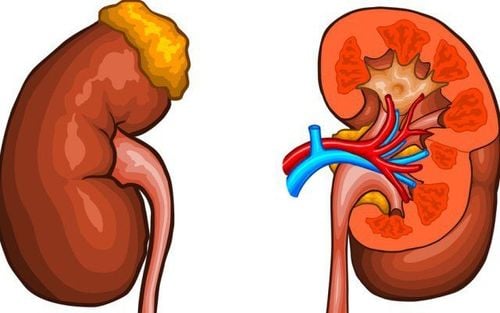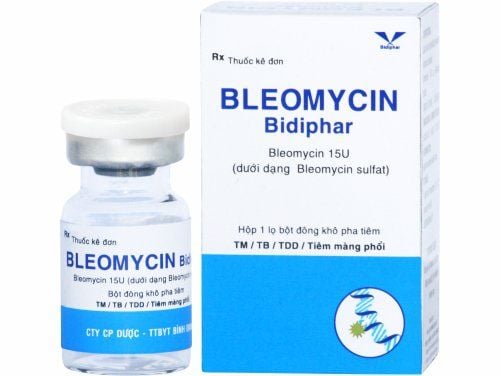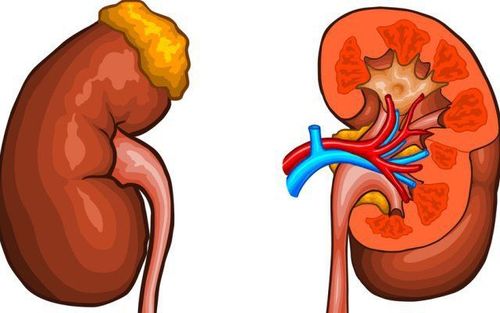This is an automatically translated article.
Renal cell carcinoma is one of the dangerous cancers, if not treated in time will affect the life. Therefore, early diagnosis and treatment play a very important role, contributing greatly to prolonging life.1. What is renal cell carcinoma?
Renal cell carcinoma is the most common type of kidney cancer (accounting for about 90% of kidney cancers).
Most people with renal cell carcinoma are older, usually between the ages of 50 and 70. It usually starts with a small tumor on one kidney or even on both sides.
Initially, cancer cells will grow gradually inside the kidney, over time, they will proliferate and divide rapidly, putting pressure on the surrounding tissues, and at the same time losing their functions. important functions of the kidneys, including their role in filtering blood and making urine.
It can be said that this is a malignant cancer, however, if detected and treated early, the patient has a higher chance of getting rid of the cancer.
Currently, medicine is developing day by day with many different cancer treatments that have been successfully researched and applied to effectively control cancer, thereby improving quality of life and prolonging life. longevity.
2. Common symptoms of renal cell carcinoma
In its early stages, renal cell carcinoma does not show any specific signs or symptoms of the disease.Only when the cancer has entered a later stage (advanced stage) will the patient have more pronounced feelings about the disease. This is also the time when the tumors begin to spread outside the kidney and invade other organs in the body, such as the brain, lungs, ..
Some symptoms that patients can easily notice when suffering from cancer renal cell carcinoma, which includes:
Blood in the urine Persistent pain in the lower back A lump in the side, abdomen or lower back Not enough red blood cells (anemia) Unexplained weight loss Fever Body fatigue Loss of appetite, loss of appetite High blood pressure Frequent sweating at night High blood calcium levels If you notice any of the symptoms listed above occur above, you should see your doctor immediately, as you most likely have renal cell carcinoma. The earlier it is diagnosed and treated, the better the chance of a cure.

Huyết áp cao có thể là một trong những triệu chứng của bệnh ung thư biểu mô tế bào thận.
3. Diagnosis of renal cell carcinoma
Before performing diagnostic tests for renal cell carcinoma, the doctor will do a physical examination of the patient and ask the patient to provide the following information:
What problem are you having? Do you have blood in your urine? In which area do you feel pain? Are your symptoms worse than before? Does anyone in your family have von Hippel-Lindau disease or kidney cancer? After knowing the basic information about the patient's health condition, the doctor can recommend that the patient perform diagnostic tests to make an accurate conclusion whether they are suffering from carcinoma. renal cell tissue or not?
Tests commonly used to diagnose renal cell carcinoma include:
3.1 Urine test
Urine test helps the doctor check whether there is blood in the patient's urine?
3.2 Blood tests
Blood test to check the level of creatinine in the blood. If the results show that the patient's blood creatinine is high, it also means that there is a problem with their kidneys.
3.3 Biopsy
The doctor will take a tissue sample from the kidney, then take it to a laboratory for testing
3.4 Ultrasound
Ultrasound uses sound waves to create images of the patient's internal organs, allowing doctors to examine the tissues in the kidneys.3.5 CT scan
CT scan uses X-rays to create detailed pictures of the inside of a person's body, it helps doctors find cancer cells in the kidneys or in other tissues inside the abdomen.
If the test results show that you have renal cell carcinoma, your doctor will determine the stage of the disease and recommend appropriate cancer treatment options.
The stage of the cancer will depend on the size of the tumor and whether the cancer has spread to other parts of the body. You may also have other tests to make a more thorough diagnosis of your condition, such as: chest X-ray, MRI scan, bone scan.
4. Treatment of renal cell carcinoma
Patients can choose to undergo treatment for renal cell carcinoma with one of the following methods:
4.1 Surgery
Patients may consider surgical removal of one kidney or even the entire kidney to completely remove the tumor inside the kidney. This type of treatment depends on the stage of the disease, if the cancer has spread, surgery is not a viable option.

Bệnh nhân có thể lựa chọn hình thức phẫu thuật để cắt bỏ khối u trong thận
4.2 Use of biological drugs
Biologic drugs help increase the body's defenses against cancer cells.
4.3 Immunotherapy
Immunotherapy treats renal cell carcinoma with the use of drugs such as interferon-alfa or interleukin-2.
4.4 Targeted therapy
This treatment will attack the vital elements the cancer needs to survive, such as the tumor's blood vessels or certain proteins; These include axitinib (Inlyta), bevacizumab (Avastin), cabozantinib (Cometriq), everolimus (Afinitor), lenvatinib (Lenvima), nivolumab (Opdivo), pazopanib (Votrient), sorafenib (Nexavar), sunitinib (Sutent), and temsirolimus (Torisel).
4.5 Radiofrequency Ablation (RFA) Therapy
Treatment of renal cell carcinoma using ultra-cold waves or high-energy radio waves to burn and destroy malignant tumors.
4.6 Adjuvant therapy
Adjuvant therapy is the combination of using both radiation and chemotherapy at the same time during cancer treatment. However, these treatments are often not very effective for renal cell carcinoma.
It can be said that making reasonable cancer treatment options is an extremely important step in the entire cancer treatment process. Choosing an effective treatment means you have more than half the chance of getting rid of the disease.
5. Ways to control renal cell carcinoma
To be able to control this malignant cancer well, patients need to pay attention to the following:
5.1 Make a proper nutrition
Should add a full range of essential nutrients into your daily meals to help the body increase resistance. This greatly helps the patient's cancer treatment process. Also, if you find it difficult to eat, you can eat many small meals throughout the day instead of trying to eat three large meals as usual.
5.2 Exercise and be physically active
Daily exercise is good for your body and mind. Yoga exercises or gentle walks can help you reduce stress and fatigue due to illness.

Tập yoga là phương pháp hữu hiệu để người bệnh giải tỏa căng thẳng
5.3 Adhere to the correct course of treatment
You should strictly follow your doctor's instructions about the use of drugs or lifestyle during cancer treatment.
5.4 Get support
You can get help from a loved one or palliative care team during cancer treatment.
To register for medical examination and treatment at Vinmec International General Hospital, you can contact Vinmec Health System nationwide, or register online HERE.
Reference article: webmd.com
MORE:
Preventable kidney cancer Adrenal cancer: Causes and symptoms Advances in the treatment of kidney cancer













